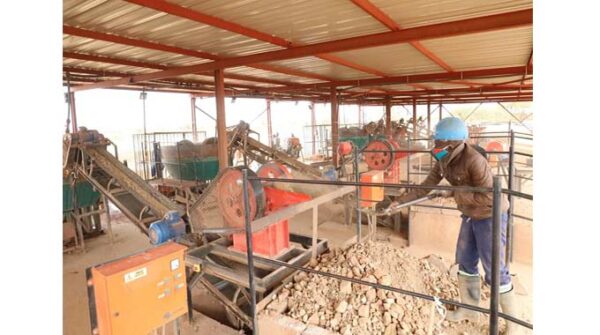The majority of artisanal and small-scale mining activities operate informally, which means they take place illegally without the required licences and permits. Despite the existence of legal frameworks for ASM in many countries around the world, the majority of operations remain unregulated and untaxed.
Often, informal activities will have a ‘social licence to operate’. This may come from the local community, other local actors, or miners owning the surface rights or the land above ground. This is despite the state being the sole owner of sub-surface mineral rights and the only actor able to award concessions and official mining licences.
The process of formalisation therefore not only concerns the development and existence of legal, regulatory and policy frameworks for ASM, but also the extent to which these are successfully activated, implemented, and enforced, and whether they are appropriate and sufficiently in tune with local contexts and communities.
Formalisation offers advantages not only to artisanal and small-scale miners but also to governments, large-scale mining companies, and rural communities. Formalisation:
- Helps promote better working practices and conditions.
- Reduces negative environmental impacts of activities.
- Prevents and helps to better manage conflict associated with encroachment of miners and operations onto large-scale mining concessions.
- Supports ASM to become an engine of enterprise and growth leading to higher government returns and job creation and stability.
- Enables government to capture the revenues and tax from ASM activities.
- Is an essential first step to transforming ASM into a sustainable livelihood activity.
- Reduces criminality and criminal elements associated with some ASM activities.
Formalisation, however, is not an easy task and there is no single policy response or solution. There needs to be a concerted, collaborative effort as well as the will to formalise from all stakeholders involved. This includes international development agencies, governments, NGOs, academic experts, the private sector, local ASM communities, and crucially, miners themselves.
A number of issues and improvements are often cited as key parts of the ASM formalisation process:
Streamlined licensing
Despite many countries now having legal frameworks for ASM that allow for the purchase of a licence, the majority of mining operations and miners work informally and illegally without a licence and/or any additional required permits.
In some cases, obtaining a licence can be a long and bureaucratic process that may also be open to corruption and bribery. These issues may either entirely prevent and/or discourage people engaged in ASM from purchasing a licence. Streamlining the licensing process by making it easier to complete, reducing the time, fees and costs associated with obtaining one, decentralising the process, developing easily accessible online platforms, and ensuring regulations and categories are in line with local contexts can help significantly with formalisation.
Access to land and geological prospecting
A commonly cited issue is either the lack of access to or availability of land that is also of significant ore grades to make the mineral deposit viable for ASM.
Conducting geological prospecting and identifying and demarcating land and zones specifically for ASM activities would help address this issue.
Encouraging large-scale mining companies and concessionaires to shed off areas of land that are either not being mined or are deemed uneconomical to mine on a large scale would also help free up areas for ASM activities.
Technical and vocational education and training
Developing accessible technical and vocational education and training (TVET) courses and materials for miners that include information on safe working practices and more efficient and effective mining techniques in order to reduce the negative social and environmental impacts of operations and improve working conditions, efficiency, yields and incomes.
Support and equipment leasing facilities, and processing centres for ASM
Develop support facilities for miners to attend in order to receive information, lease or purchase good quality equipment, and process ores. It is important that the needs of miners and the community are properly assessed first to ensure support facilities meet their requirements and local contexts.
Improve the capacity, strength, and collaboration of institutions and government
Strengthening government departments and institutions, and encouraging collaboration of different ministries and departments at both the national and local level in order to develop more effective, joined-up approaches and remove overlapping functions.
Better monitoring, enforcement, and education on laws and regulations
Increase capacity of government agencies to better monitor ASM activities and more effectively and consistently enforce fines and penalties where applicable.
Better educate miners on the laws and regulations that exist and build good working relationships between enforcement agencies, miners, and ASM communities.
Formulating policies, regulations, and laws specifically for the ASM sector
Ensuring that existing laws and regulations are appropriate and sufficiently in tune with ASM activities and local contexts.
When no or few regulations exist, or ASM is covered under regulations and laws designed for large-scale mining activities, there is a need to develop new laws, policies, and regulations solely for ASM.
Improve the coordination and involvement of ASM associations and cooperatives
Improving the development, coordination, and strength of ASM associations and increasing their involvement in decision making is key to ensuring the development of effective policy and programmes.
Having legitimate and well-organised national and international level ASM associations is beneficial to miners as well as policymakers and government. Associations provide a single entity with which to engage and consult on matters, a forum for the exchange of knowledge and ideas, and a grievance and dialogue mechanism for all sides.
Cooperatives also offer these benefits as well as enabling miners to pool their resources. In some countries being a member of a cooperative is a legal requirement to purchase an ASM licence.
This article first appeared in the July 2021 issue of Mining Zimbabwe Magazine





